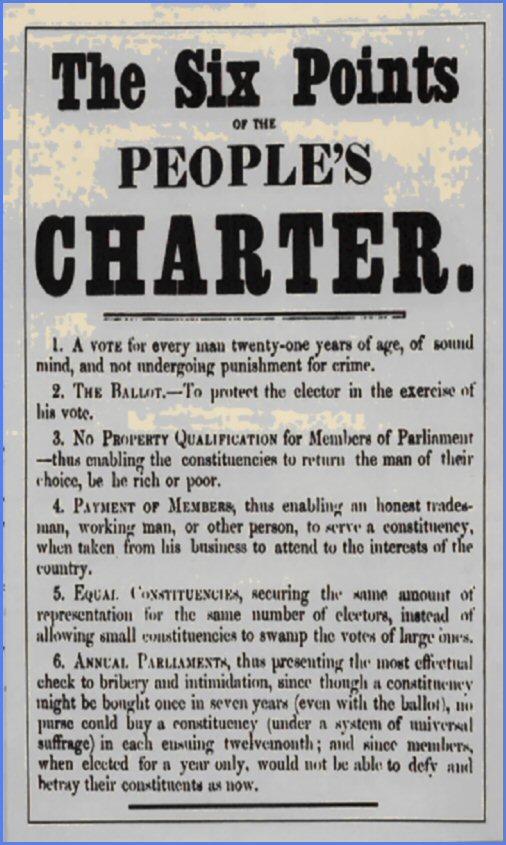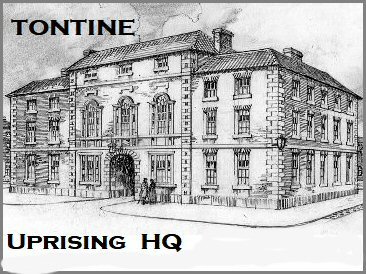
The Sheffield Working
Men’s Association, the Planned
Uprising of 1840 and the Role of Peter Foden, Agitator
The Sheffield Working Men’s Association (SWMA) was founded
in 1837. One authority maintains the Association was established on
October 14th
1837, while another gives the date of its founding as December 1837.
Little is
known about SWMA except that one of it’s aims was to promote the
demands of the
People’s Charter.
SWMA organised meetings & processions to publicise the
Charter and worked to bring pressure on the authorities to accept the
Charter.
Early meetings were peaceful if boisterous.
On September 17th 1838, Ebenezer Elliott had
addressed the great Chartist Meeting
in Westminster Palace Yard and a week
later on September 26th, he introduced the Charter to the
people of
Sheffield with a procession and meeting attended by thousands of
people. The
procession was led by the banners of the SWMA and the Sheffield Political Union. (For more information on
this important Sheffield meeting, see the article Elliott
brings the Charter to Sheffield). The event was presided over by
Elliott, but
it is not clear if the meeting was organised by SWMA or not. Earlier, a
petition to the Master Cutler urging him to call the meeting was signed
by 92
people; the first signature was Elliott’s. The Master Cutler declined
the
petition. As Elliott was a SWMA member, it is likely that the petition
was
drawn up by the Association. With the Master Cutler rejecting the call
for a
meeting, perhaps arranging the meeting was a joint effort of the SWMA
and the Sheffield
Political Union.
At this time the Chartists were mainly using political
pressure as a way forward, but as time went on the lack of progress
made people
frustrated, and the use of force became dominant. Elliott was always
against using
violence and in May 1839 he severed his links with SWMA; his letter of
resignation is shown below.
Sheffield,
May 6, 1839 TO
THE SECRETARY OF
THE SHEFFIELD WORKING MEN’S ASSOCIATION Can’t your enemies starve you fast enough?
If they can, why
do you seek to get yourselves butchered like sheep? The Convention, by
defending monopoly and advocating physical force, are fighting the
battle of
the aristocracy under the people’s colours – a battle ultimately for
self-destruction, and which these magnificent wretches are well able to
fight
for themselves without your assistance. I learn, from the newspaper of
Saturday
last, that your representative in the Convention (with the occurrence
of your
own men) are about to send deputies into the country to advocate the
starvation
laws! Of those laws you will soon have quite enough; and so, thank God!
will
their authors. If you like such laws, what use do you intend to make of
the
franchise when obtained? I have no wish to force my opinions on you.
No; you
will soon be starved to your heart’s content, for we shall not have
long to
wait. But, in the meantime, it must not be supposed that I am one of a
body of
men who are willing to be represented by persons capable of supporting
such
barbarous legislation. If, then, my name is on your list of members,
please
erase it; and oblige your fellow-townsman. EBENEZER
ELLIOTT
| Clearly , Elliott could see that resorting to physical force would allow the government to clamp down and use the military to crack down brutally on protesters. So the Corn Law Rhymer wanted none of it and opted out. |
When the government rejected the Chartists ‘s First Petition, the mood of the country changed and things started to turn ugly. Frustration led to more and more violent confrontations. In Sheffield, in July 1839, magistrates banned meetings about the Charter, yet on August 12th there was a huge meeting arranged by SWMA. The meeting was broken up by troops. Further illegal meetings were held almost daily, and the military made lots of arrests.

Peter Foden, agitator
Peter Foden was a young firebrand who was warned by
magistrates in the summer of 1839 about his involvement in riots. He
was
subsequently arrested in early August and did not get bail until
September 3rd
when Elliott and a file manufacturer called Wolstenholm stood bail.
(The latter
was soon to become the leader of SWMA). Both men were to lose their
bail money.
For Elliott to put up bail money, Foden must have been well known to
the poet
who must also have felt great sympathy for Foden’s plight.
Foden (1811-1871) was a baker and confectioner whose business in Sheffield was on Bank Street. He was a great admirer of Feargus O’Connor, the fiery Chartist who edited the Northern Star newspaper, the organ of the Chartist movement. (O’Connor had made a lively speech in Sheffield in July 1839). Foden named one of his children after his hero, naming his son Feargus O’Connor Foden, the unfortunate child only living for 18 months dying while his father was in prison.
A Brief Summary of Sheffield’s
Planned Uprising
Peter Foden was one of the leaders of the planned uprising
of 1840. The plotters were well organised and believed that when they
seized
the city, they would gain popular support.
Each cell leader recruited supporters & stockpiled guns, pikes and
hand grenades. The leaders arranged to hold a final meeting at
10pm on Saturday 11th January
1840 before going ahead with the uprising.
The plan was to seize the town hall and the Tontine Inn which they would use as their headquarters. Gun shops were to be raided for extra guns and ammunition. The homes of magistrates were to be torched and the mansions of prominent gentry were to be sacked. Any policemen encountered were to be killed. When troops had left their barracks to deal with the troubles, the barracks were to be set on fire.

The plot did not succeed, as James Allen, landlord of the
Station Inn at Rotherham, turned informer allowing the authorities to
prevent
the uprising at the last minute.
The leader of the uprising, Samuel Holberry, received five years while other leaders had shorter sentences. Peter Foden was accused of conspiracy, sedition and riot, but fled to Wales. When he returned to Sheffield in December 1840, he was arrested and sentenced to two years imprisonment. On release in 1843, he moved to Stalybridge – where his father was living – and set up as a baker. Soon he moved to Doncaster where it is thought he also established a bakery. In 1854, he moved to the United States where he was well-regarded. He died there in 1871.
To
return to the Ebenezer Research Foundry, click the
anvil 
To
return to Ebenezer's home page, please click here